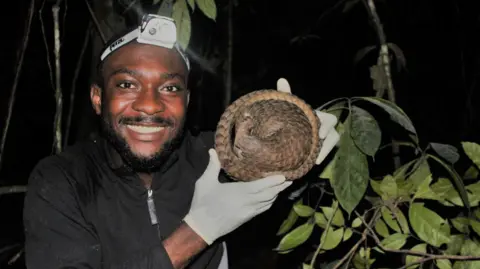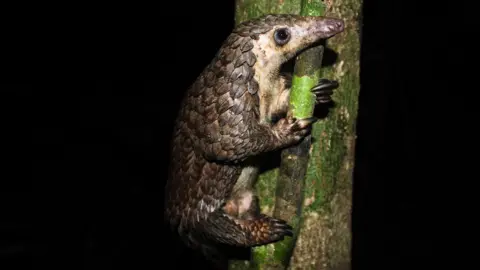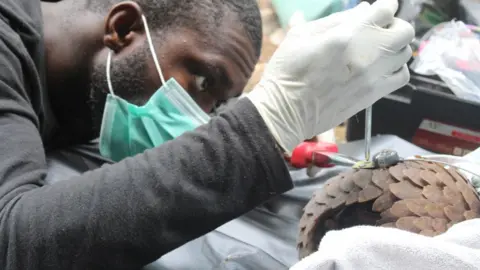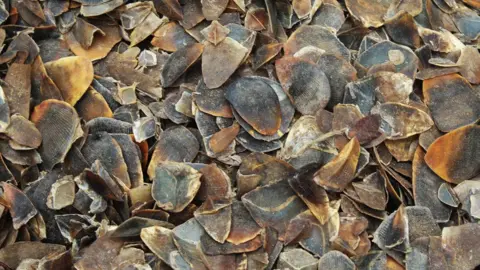 Charles EmogorCharles Emogor with a pangolin, which has rolled itself up into a tight ball, first became fascinated by the animals as a boyA scientist has revealed he initially thought he was being scammed when he learnt he had been awarded an international prize for his work trying to save the pangolin.
Charles EmogorCharles Emogor with a pangolin, which has rolled itself up into a tight ball, first became fascinated by the animals as a boyA scientist has revealed he initially thought he was being scammed when he learnt he had been awarded an international prize for his work trying to save the pangolin.
Charles Emogor, who lives in Cambridge, set up Pangolino in his home country Nigeria in a bid to save the endangered animal, which is the most trafficked mammal in the world, according to the World Wide Fund for Nature (WWF).
He has received the Animal Action award from the International Fund for Animal Welfare charity.
Dr Emogor said it was "really, really humbling to get this recognition", having set up the charity to highlight "how vulnerable pangolins are and hopefully galvanise international support".
"If we lose the pangolin, we would be losing 80 million years of evolution – they are the only mammals with scales and they existed when dinosaurs were still on the planet," the 29-year-old said.
 Charles EmogorThe solitary, primarily nocturnal animals, also called scaly anteaters, feed only on ants and termites, providing important pest control, said Dr EmogorIn 2019, WWF reported 195,000 pangolins were trafficked for their scales alone.
Charles EmogorThe solitary, primarily nocturnal animals, also called scaly anteaters, feed only on ants and termites, providing important pest control, said Dr EmogorIn 2019, WWF reported 195,000 pangolins were trafficked for their scales alone.
The demand is mostly from China, but also from the United States, where leather is used for boots, bags and belts.
Dr Emogor, who has a PhD in Zoology from the University of Cambridge, set up the charity in his home state, Cross River State, on the border with Cameroon.
"It's a hotspot for the illegal trade of pangolin trade coming out from other parts of Africa and shipped elsewhere, but mostly to China," he said.
 Charles EmogorLittle is known about how large each mammal's home range is, so the charity has previously attempted to track them, although that project is currently in abeyanceThe area is home to two of Nigeria's species – the endangered white-bellied and black-bellied pangolins.
Charles EmogorLittle is known about how large each mammal's home range is, so the charity has previously attempted to track them, although that project is currently in abeyanceThe area is home to two of Nigeria's species – the endangered white-bellied and black-bellied pangolins.
The charity's research revealed that the majority of the mammals poached in Cross River State were hunted for their meat, compared to 30% for their scales.
Dr Emogor said: "Growing in this landscape, I appreciate the use of wild meat for food and to the best of my knowledge they're not selectively hunted – the hunters usually just kill anything they can find."
As a result, Pangolino, which was set up in 2019, is working with community leaders to create an incentive-based by-law to ensure hunters "get some economic gain for not killing pangolins".
"We're still in the early stages of implementing this intervention, gathering data, but so far communities are very excited about it and shown a willingness to engage," said Dr Emogor.
He added that he thought he was "being scammed" when he got an email notifying him of the award, but he was also "very excited" about the news.
 Charles EmogorThe demand for scales is driving the majority of the poaching of the mammals around the world Follow Cambridgeshire news on BBC Sounds, Facebook, Instagram and X.
Charles EmogorThe demand for scales is driving the majority of the poaching of the mammals around the world Follow Cambridgeshire news on BBC Sounds, Facebook, Instagram and X.
